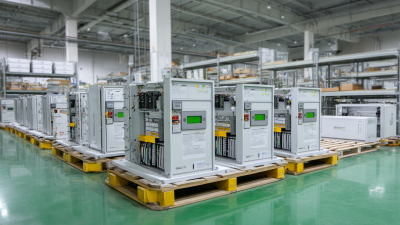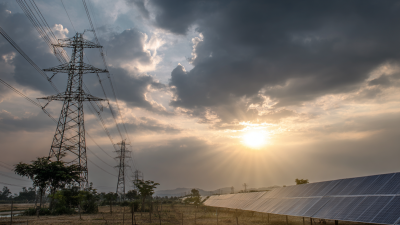SunVena Solar Blog
Residential Solar News, Insights & Resources
Top Strategies for Optimizing the Performance of 5kw Solar Inverters
In the quest for sustainable energy solutions, the 5kw solar inverter plays a pivotal role in maximizing the efficiency of solar power systems. As households and businesses increasingly turn to solar energy, understanding how to optimize the performance of these inverters becomes paramount. This ultimate guide delves into the top strategies for enhancing the efficacy of 5kw solar inverters, ensuring that users can harness the full potential of their solar arrays while reducing energy waste. We will explore key factors influencing inverter performance, maintenance tips, and the latest technological advancements, providing you with the tools needed to enhance energy production and achieve your renewable energy goals. Whether you're a seasoned solar user or just beginning your journey into renewable energy, these insights will empower you to make informed decisions that lead to long-term benefits and sustainability.

Understanding the Importance of Efficient 5kW Solar Inverters
Efficient solar inverters are crucial for maximizing the output of a solar power system, especially with popular models like the 5kW inverters. Understanding the importance of efficiency can have a significant impact on energy production and overall system performance. A well-performing inverter not only converts solar energy more effectively but also enhances energy management, ensuring that homeowners get the most value from their solar investments. Key factors such as inverter efficiency rates, installation practices, and technology advancements play vital roles in determining how much energy is harnessed from solar panels.
As the market evolves, it's essential to stay informed about the latest developments in solar inverter technology. The competition among leading manufacturers highlights the differences in specs and warranties, which can affect long-term performance and reliability. For example, the shift towards inverters that offer unlimited cycles can be appealing, but it's crucial to understand the limitations these warranties may have. By recognizing the nuances of various inverter models and making informed choices during installation, homeowners can optimize their solar systems, minimize potential issues, and maximize savings over time.
Key Factors Influencing the Performance of 5kW Solar Inverters
When it comes to optimizing the performance of 5kW solar inverters, several key factors come into play. One crucial element is proper installation. Ensuring that the inverter is installed in an optimal location with adequate ventilation can significantly enhance its efficiency. Inverter performance can be drastically affected by overheating, so it's essential to avoid direct sunlight and provide sufficient airflow around the unit.
Another important consideration is regular maintenance. Periodic inspections can help identify and resolve issues before they escalate. For instance, checking and cleaning the inverter's connections and ensuring that all components are functioning correctly can prevent performance dips. Additionally, monitoring the system's output can alert you to any irregularities.
Lastly, understanding the inverter's specifications and pairing it with compatible components is vital. Using high-quality solar panels and batteries that match the inverter’s capacity can lead to better energy conversion and storage. It is also advisable to observe the environmental impacts, such as shading from nearby trees, which can hinder the system's overall performance. By paying attention to these factors, users can significantly optimize their 5kW solar inverter systems.
Top Strategies for Optimizing the Performance of 5kW Solar Inverters
| Strategy | Impact on Performance (%) | Recommended Maintenance Frequency | Cost Implication ($) |
|---|---|---|---|
| Regular Cleaning of Panels | 10% | Monthly | 50 |
| Optimal Orientation and Tilt | 15% | Once | 200 |
| Installation of Microinverters | 20% | N/A | 1000 |
| Regular Software Updates | 5% | Quarterly | 0 |
| Temperature Management | 8% | Annual | 300 |
Best Practices for Regular Maintenance of Solar Inverters
Regular maintenance of solar inverters is crucial for ensuring optimal performance, especially for 5kW systems. Inverters are the heart of solar energy systems, converting direct current (DC) energy from solar panels into alternating current (AC) energy that can be used in homes. To keep these systems running efficiently, it is essential to establish a maintenance routine that includes regular inspections and cleaning. Dirt and debris can accumulate on solar panels and inverters, leading to decreased efficiency and potential damage.
In addition to physical upkeep, monitoring system performance through data analysis is vital. This allows users to identify any issues early on, such as drops in energy production, which may indicate malfunctioning components. With the ongoing developments in the solar industry, such as new policies encouraging solar installation, staying informed on best practices for maintenance will help users not only comply with regulations but also maximize their return on investment in solar technology. By adopting these best practices, homeowners can significantly enhance the reliability and lifespan of their solar inverters.

Advanced Technology Upgrades for Enhanced Inverter Performance
Investing in advanced technology upgrades can significantly enhance the performance of 5kW solar inverters. By incorporating cutting-edge features such as MPPT (Maximum Power Point Tracking) algorithms, inverters can optimize energy capture from solar panels, ensuring that they operate at peak efficiency regardless of environmental conditions. This not only maximizes energy output but also extends the lifespan of the inverter by reducing stress on its components.
Tips for enhancing inverter performance include regularly updating software to take advantage of new features and improvements. Many manufacturers release firmware updates that can optimize performance and address any bugs found in previous versions. Additionally, installing a high-quality surge protector can safeguard your inverter against sudden voltage spikes, ensuring consistent operation and prolonging its lifespan.
Another effective strategy is to invest in real-time monitoring systems. By keeping track of your inverter's performance metrics and energy production, you can quickly identify any discrepancies that may indicate performance issues. Early detection allows for prompt maintenance, minimizing downtime and maximizing the overall efficiency of your solar energy system.
Top Strategies for Optimizing the Performance of 5kW Solar Inverters
This chart illustrates the performance improvements in 5kW solar inverters through various optimization strategies. The data shows the percentage increase in efficiency and output for each strategy implemented.
Monitoring and Analyzing Inverter Performance for Optimal Output
 Monitoring and analyzing inverter performance is crucial for ensuring optimal output from 5kW solar inverters. By utilizing advanced monitoring systems, solar energy producers can track the operational efficiency of their inverters in real-time. These systems provide valuable insights into various performance metrics, such as energy output, operational hours, and fault conditions, allowing for timely interventions when issues arise.
With the right monitoring tools, users can ensure their systems operate at peak performance, reducing energy losses and increasing overall yield.
Monitoring and analyzing inverter performance is crucial for ensuring optimal output from 5kW solar inverters. By utilizing advanced monitoring systems, solar energy producers can track the operational efficiency of their inverters in real-time. These systems provide valuable insights into various performance metrics, such as energy output, operational hours, and fault conditions, allowing for timely interventions when issues arise.
With the right monitoring tools, users can ensure their systems operate at peak performance, reducing energy losses and increasing overall yield.
Moreover, analyzing inverter performance data over time can help identify patterns and trends that may indicate necessary maintenance or upgrades. By comparing historical performance against expected benchmarks, users can pinpoint inefficiencies and make informed decisions about system enhancements. Regular performance assessments not only help optimize the immediate output of the inverters but also extend their lifespan, ensuring a smarter investment in solar technology. Emphasizing proactive monitoring and analysis empowers solar energy users to maximize their returns while contributing to a more sustainable energy future.
Related Posts
-

How to Choose the Right Solar River Inverter for Your Energy Needs
-

Mastering Your 3kw Solar Inverter Setup A Step by Step Tutorial for Beginners
-

Navigating Import and Export Certifications for Best on Grid Solar Inverters in the Global Market
-

Mastering Your Solar System with the Best Must Solar Inverter Selection Guide
-

Innovative Examples of RV Solar Inverter Technologies Shaping Sustainable Travel
-

Unlocking Energy Independence with Solar Power Inverter for Home Benefits